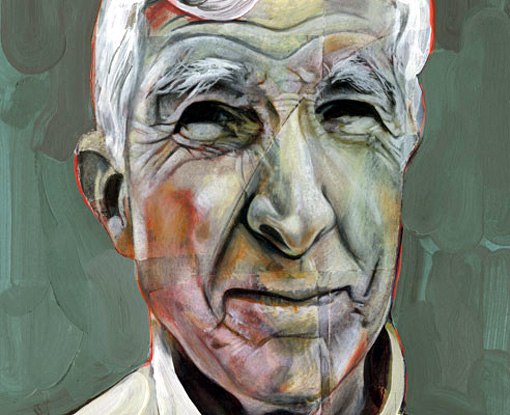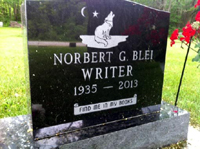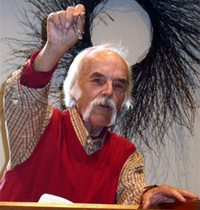
Poetry Dispatch No.267 | January 29, 2009
UPDIKE’S POEMS
by
Norbert Blei
He was one of our last major American writers who also paid attention to a lost art form: light verse. There was always humor in Updike’s lines, but he seemed especially fond of playing with words, rhythm, sound and ideas, “lightly’ in verse.
A contemporary of his, Phyllis McGinley, the queen of suburban light verse (THE LOVE LETTERS OF PHYLLIS McGINLEY, 1954) achieved considerable fame and respect herself in this form, though she came nowhere close to ‘also’ mastering the novel, the short story, journalism, criticism and ‘serious’ poetry.
As I continue to downsize my considerable library, I come upon book after ‘cheap’ paperback book–faded covers, yellowed or tanned pages, margin notes, underlined passages, bent spines or books still spotless, brand new…priced 35¢, 75¢, $1.00, $1.25 etc. Who could possibly love or honor these books more than I? All small, precious ‘pocket books’ that I cannot—give away? Sell? Trash? Who would want this stuff today, given what’s out there? Of what possible value would these antique texts be to anyone but (hopefully)…a ‘young’ writer who prefers to hold a real book in his hands? Or a serious reader? Any reader at all? This is the stuff even a library doesn’t want. Literary fodder. Extinct. Books destined to be ‘disappeared’ in one manner or another. So… I may as well keep them and request to be burned and buried with my old paperback books.
Among these, I find and delight in (once again), young Updike’s light verse.
![]()
FOREWORD
My poems, at Mammon’s grim behest,
Have been collected here by Crest.
Forgive them, if they seem to thin;
Diaphanousness is no sin
In ballerinas’ skirts, so why
My own transparency decry?
It pleased me once to write them, and
I’m pleased to place them in your hand.
[from VERSE, Crest, 1965, 75¢]

![]()
THOUGHTS WHILE DRIVING HOME
Was I clever enough? Was I charming?
Did I make ay least one good pun?
Was I disconcerting? Disarming?
Was I wise? Was I wan? Was I fun?Did I answer that girl with white shoulders
Correctly, or should I have said
(Engagingly), “Kierkegaard smolders,
But Eliot’s ashes are dead?”And did I, while being a smarty,
Yet some wry reserve slyly keep,
So they murmured, when I’d left the party,
“He’s deep. He’s deep. He’s deep”?
[from VERSE, Crest, 1965, 75¢]
As much as my life is devoted to reading and writing, as fortunate as I am to be always near, in touch with writers, artists, readers, here/there/everywhere, I have rarely heard ‘serious poet’ come up in any discussion of John Updike. “They” will give him his light verse…but then it’s off to his ‘pretty prose”, his cultural perceptiveness, his sexual city and suburban motifs in short and long narratives.
But here’s a reminder: the man wrote a hell of a ‘serious’ poem as well. Don’t ever forget—or deny him this.
Who knows when any writer ‘discovers’ death creeping into his work for the first time. For some, it’s there in the very beginning. For others, it slips into his or her mid-life prose and poems. Still others may inadvertently write ‘goodbye’ only days or months before they write the final word.
ALL of the above seems ‘probably” true in Updike’s light and heavy world of getting one’s whole life down in words.

![]()
Burning Trash
At night—the light turned off, the filament
Unburdened of its atom-eating charge,
His wife asleep, her breathing dipping low
To touch a swampy source—he thought of death.
Her father’s hilltop home allowed him time
To sense the nothing standing like a sheet
Of speckless glass behind his human future.
He had two comforts he could see, just two.One was the cheerful fullness of most things:
Plump stones and clouds, expectant pods, the soil
Offering up pressure to his knees and hands.
The other was burning the trash each day.
He liked the heat, the imitation danger,
And the way, as he tossed in used-up news,
String, napkins, envelopes, and paper cups,
Hypnotic tongues of order intervened.
[Collected Poems 1953-1993 , Knopf, 1993]

![]()
Perfection Wasted
And another regrettable thing about death
is the ceasing of your own brand of magic,
which took a whole life to develop and market-
the quips, the witticisms, the slant
adjusted to a few, those loved ones nearest
the lip of the stage, their soft faces blanched
in the footlight glow, their laughter close to tears,
their warm pooled breath in and out with your heartbeat,
their response and your performance twinned.
The jokes over the phone. The memories packed
in the rapid-access file. The whole act.
Who will do it again? That’s it: no one;
imitators and descendants aren’t the same.
[from Collected Poems 1953-1993, Knopf, 1993]

![]()
The poem, “Requiem” by all indications was John Updike’s most recent—and last word on the subject. It will appear in a forthcoming collection of his work:
Requiem
It came to me the other day:
Were I to die, no one would say,
‘Oh, what a shame! So young, so full
Of promise – depths unplumbable!
Instead, a shrug and tearless eyes
Will greet my overdue demise;
The wide response will be, I know,
‘I thought he died a while ago.’
For life’s a shabby subterfuge,
And death is real, and dark, and huge.
The shock of it will register
Nowhere but where it will occur.



























































I appreciate this wake-up call. After reading it I am embarrassed to report I long ago pigeonholed the man. I read Couples back in the day after my minister told our confirmation class he really liked John Updike, but then decided I didn’t want to read any more books about old guys fucking and stuck to the book reviews. Ah, youth.